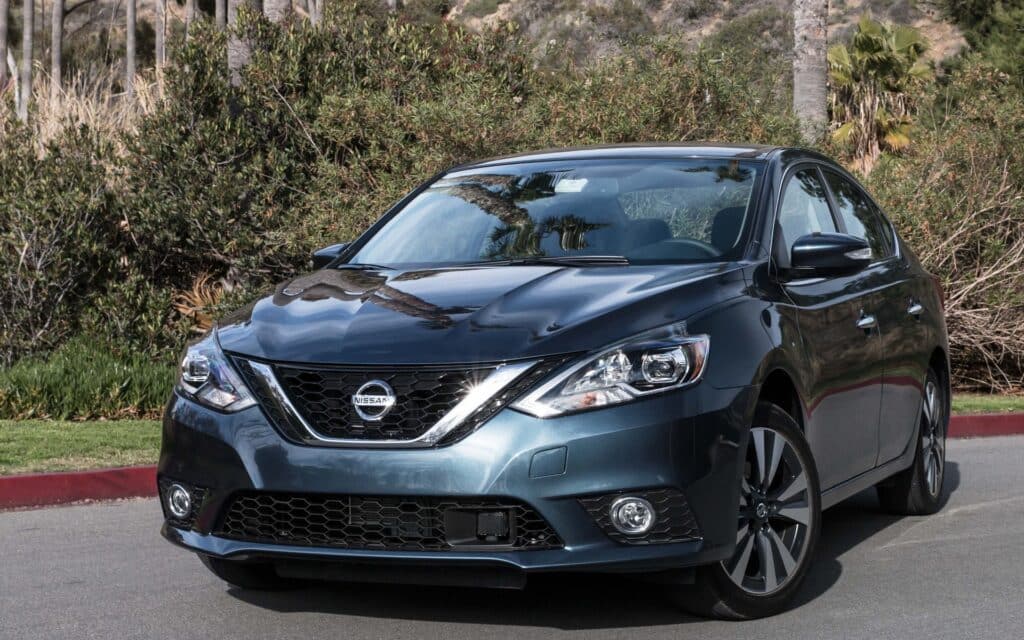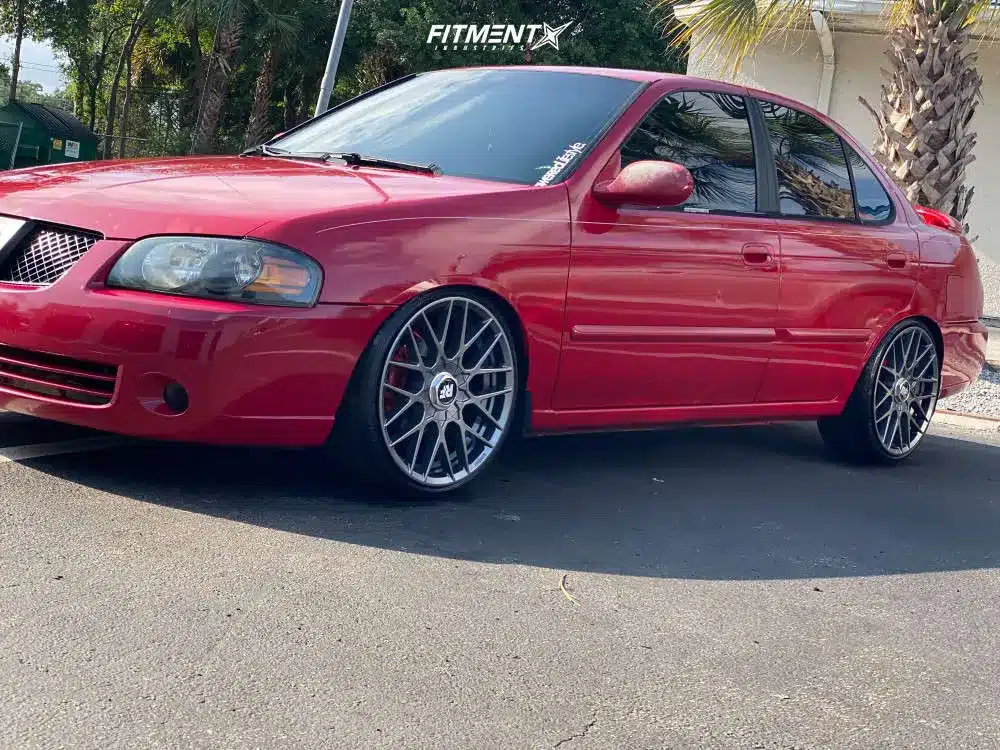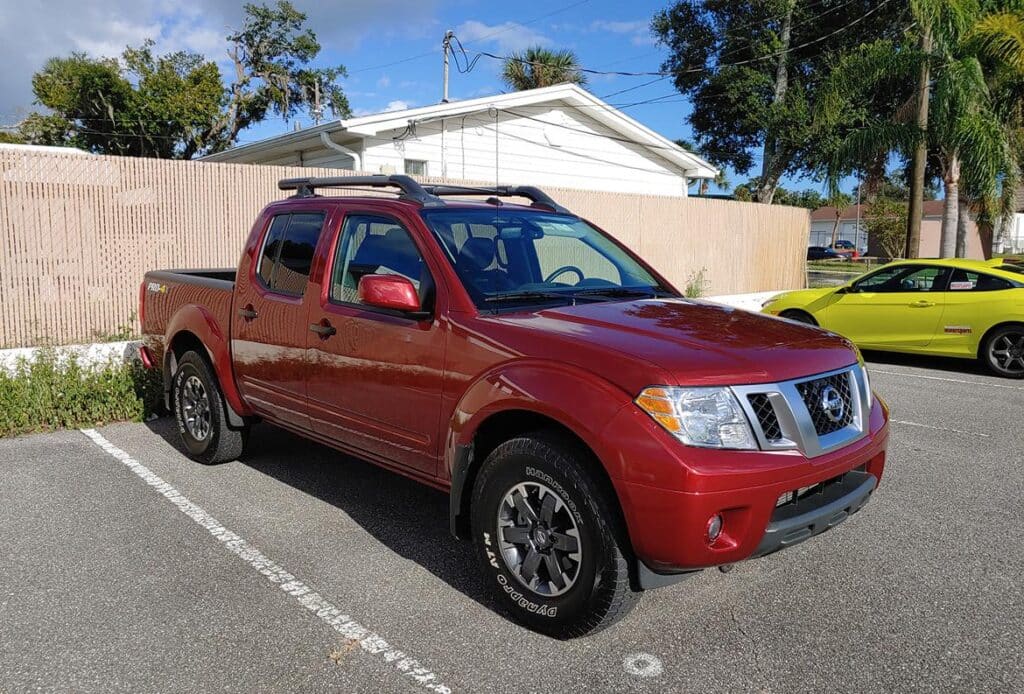The 2017 Nissan Titan is a robust, full-size pickup truck designed for those who demand performance, power, and durability. With its solid construction and advanced engine technology, the Titan truly lives up to its name. But even the most formidable of Titans require meticulous care to perform optimally. This is where the importance of using the correct oil type comes into play.
Engine oil is the lifeblood of your Nissan Titan. It lubricates the engine’s internal components, reducing friction and heat to prevent wear and tear. Not just any oil will do, however. The type of oil you use can significantly impact your truck’s performance, fuel efficiency, and longevity. The wrong oil can lead to increased engine wear, reduced fuel economy, and even serious engine damage.
Understanding the correct oil for your 2017 Nissan Titan is essential to keep it running at its best. Whether you own the 5.6L V8 VK56VD model or the 5.0L V8 CEV8D1 Diesel Turbo, each engine has specific oil requirements and capacities that must be adhered to. By using the recommended oil and following the advised maintenance schedule, you can ensure the longevity of your Titan and maintain its top-notch performance.
What Kind Of Oil Does A 2017 Nissan Titan Take?
For the 5.6L 8-cyl Engine VK56VD, the recommended oil is a 0W-20 grade. This should ideally be a Genuine Nissan Motor Oil 0W-20 SN or an equivalent high-quality synthetic oil that meets the same standards.
For the 5.0L 8-cyl Engine CEV8D1 Diesel Turbo, the recommended oil is a 10W-30 grade that meets the Cummins® Engineering Standard (CES) classification (CES 20081) and American Petroleum Institute (API) certification (API CJ-4, Low Ash Oil).
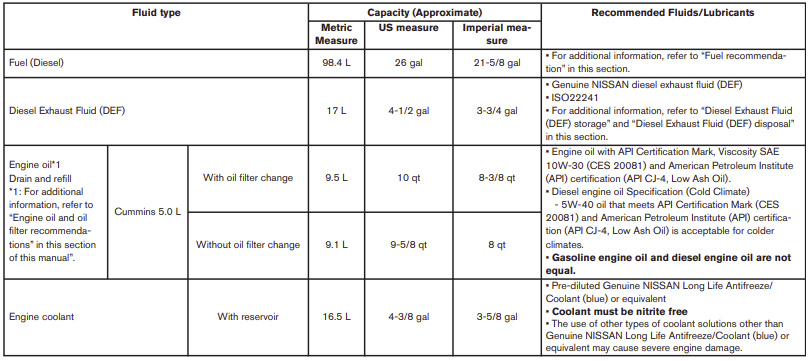
What Oil Does 5.6 Nissan Titan Take?
The 2017 Nissan Titan with a 5.6L V8 VK56VD engine requires 6.9 quarts (or 6.5 liters) of 0W-20 motor oil. This particular motor oil has been specifically chosen by Nissan due to its ability to provide excellent lubrication, reduce friction, and enhance fuel economy in a variety of temperature conditions.
Nissan recommends using a Genuine “Nissan Motor Oil 0W-20 SN” or its equivalent. This is a full synthetic oil that meets the standards of the American Petroleum Institute (API) and provides superior protection against engine wear.
What Oil Does 5.0 Nissan Titan Take?
The 2017 Nissan Titan with the 5.0L 8-cyl Engine CEV8D1 Diesel Turbo requires 10 quarts (or 9.5 liters) of 10W-30 motor oil.
It’s important to note that this oil should meet the Cummins® Engineering Standard (CES) classification (CES 20081) and the American Petroleum Institute (API) certification (API CJ-4, Low Ash Oil). These certifications ensure that the oil has the necessary qualities to provide optimal lubrication and performance for your Titan’s diesel engine.
How Much Oil Does A 2017 Nissan Titan Take?
The amount of oil that a 2017 Nissan Titan requires depends on the engine model.
- If your Titan has the 5.6L 8-cyl Engine VK56VD, it will require 6.9 quarts (or 6.5 liters) of oil.
- If your Titan has the 5.0L 8-cyl Engine CEV8D1 Diesel Turbo, it will require 10 quarts (or 9.5 liters) of oil.
These measurements include oil for the filter as well. Always remember to check your oil levels regularly and keep them within the recommended range for the best engine performance and longevity.
Understanding the 2017 Nissan Titan Engines
The 2017 Nissan Titan offers two powerful engine options that cater to different needs and preferences. Whether you prefer the traditional gas engine or the might of a diesel, understanding these engines and their specific oil requirements is crucial to maintaining their performance and longevity.
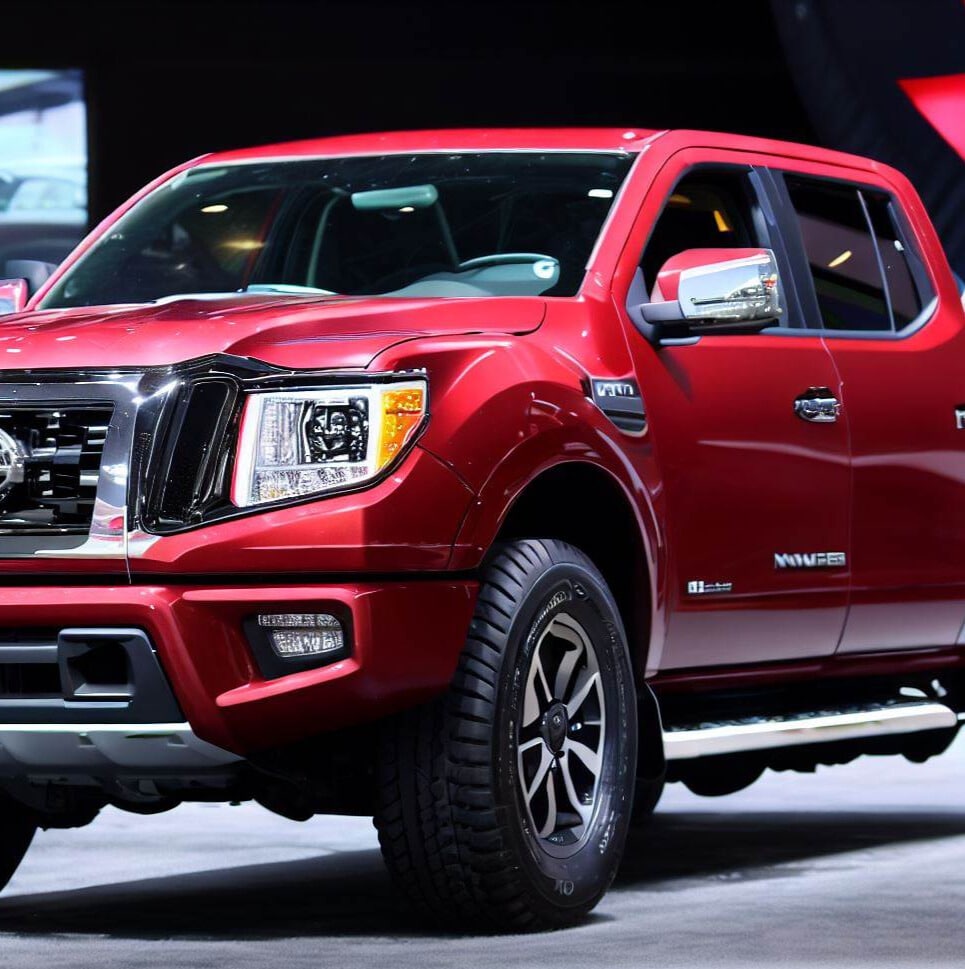
5.6L 8-cyl Engine VK56VD
The VK56VD is a 5.6-liter V8 gas engine that powers the 2017 Nissan Titan. Known for its robust performance and impressive power output, this engine requires the right kind of oil to keep it running smoothly.
The recommended oil for the 5.6L VK56VD engine is Genuine Nissan Motor Oil 0W-20 SN or equivalent synthetic oil. This engine has a capacity of 6.9 quarts (6.5 liters), including the oil filter.
5.0L 8-cyl Engine CEV8D1 Diesel Turbo
For those who prefer the raw power and torque of a diesel engine, the 2017 Nissan Titan offers the 5.0L CEV8D1 Diesel Turbo. This engine offers remarkable towing capacity and fuel efficiency.
For the 5.0L CEV8D1 engine, the recommended oil is a 10W-30 grade that meets the Cummins® Engineering Standard (CES) classification (CES 20081) and American Petroleum Institute (API) certification (API CJ-4, Low Ash Oil). This engine has a larger oil capacity compared to its gas counterpart, requiring 10 quarts (or 9.5 liters) of oil, including the filter.
Each of these engines has its unique set of requirements and operating characteristics. Always refer to your vehicle’s owner’s manual for specific maintenance schedules and oil change intervals. Regular maintenance and the use of the correct oil type and grade are vital to keeping your 2017 Nissan Titan running at its best.
Choosing the Right Oil for Your 2017 Nissan Titan
Choosing the right oil for your 2017 Nissan Titan is critical to its performance and longevity.
For the 5.6L VK56VD engine, Nissan recommends using the Genuine Nissan Motor Oil 0W-20 SN or an equivalent synthetic oil. If you have the 5.0L CEV8D1 Diesel Turbo, you should use a 10W-30 oil that meets the Cummins® Engineering Standard (CES) classification (CES 20081) and American Petroleum Institute (API) certification (API CJ-4, Low Ash Oil).
- Genuine Nissan 0W-20 Oil Change Kit
- Qty. 5 Quarts of Genuine Nissan Motor Oil 0W-20
- Includes Genuine Nissan Oil Filter 15208-65F0E (Small Nissan Filter)
- Includes Copper Washer 11026-JA00A
While the manufacturer’s recommendations should guide your choice, there are several reputable brands on the market that meet these specifications. These include Mobil 1, Valvoline, Castrol, and Pennzoil, among others. Always ensure that the oil you choose meets the required certifications and viscosity standards.
The Role of Oil Viscosity and Climate in Your Choice
Oil viscosity refers to its thickness or resistance to flow. The two numbers in an oil grade represent its viscosity at cold temperatures and at operating temperatures. For example, in 0W-20, ‘0W’ represents the oil’s viscosity in winter (cold) temperatures, and ’20’ is the viscosity at high temperatures.
Your choice of oil viscosity should consider the climate in your area. Colder climates demand lower viscosity to ensure the oil flows smoothly during cold starts. Warmer climates, on the other hand, may require higher viscosity to maintain lubrication at high temperatures.
For a deeper understanding of engine oils and their role in your vehicle’s performance, consider the following resources:
a. American Petroleum Institute’s Motor Oil Guide
b. Nissan Owner’s Manuals & Guides
Remember, using the correct oil and changing it at the right intervals is essential for the health of your Titan’s engine. If in doubt, always consult with a professional mechanic or your Nissan dealer.
Understanding Engine Oil
Engine oil plays a crucial role in the overall performance and longevity of your vehicle. It lubricates, cools, cleans, and protects the engine’s moving parts against wear and tear.
Engine oil performs several important functions:
a. Lubrication: By providing a thin barrier between moving parts, oil reduces friction and prevents wear and tear.
b. Cooling: Aside from the vehicle’s cooling system, engine oil also absorbs heat from the engine’s components, helping to manage the engine’s temperature.
c. Cleaning: Engine oil carries away dirt and metal particles, keeping them in suspension until they can be removed at the next oil change.
d. Protection: It provides a protective layer over engine components, preventing corrosion and rust caused by exposure to oxygen and moisture.
Different Types of Engine Oil
There are mainly four types of engine oils:
a. Full Synthetic Oil: These are chemically engineered oils that offer excellent lubrication, performance, and longevity. They perform exceptionally well in extreme temperatures and are ideal for high-performance and high-mileage vehicles.
b. Synthetic Blend Oil: As the name suggests, this is a blend of synthetic and conventional oils. It offers better resistance to oxidation and performance in low temperatures than conventional oil, but at a lower cost than full synthetic.
c. Conventional Oil: This is the standard motor oil for many vehicles. It’s ideal for light-duty, late-model cars with a low to average mileage and a simple engine design.
d. High-Mileage Oil: Designed for vehicles with over 75,000 miles. They contain additives that help restore seals, reduce oil consumption, and improve compression.
Remember, the type of oil you use in your 2017 Nissan Titan should meet the specifications set out in your vehicle’s owner’s manual. Always use the recommended oil type to ensure your engine performs optimally.
Understanding Engine Filters for 2017 Nissan Titan
Engine filters are an integral part of your Nissan Titan’s performance and durability. They ensure the longevity of your vehicle by filtering out potentially harmful contaminants before they can damage your engine.
- The Purpose of Engine Filters
Protection: The primary role of the engine filter is to prevent dust, dirt, and other contaminants from entering the engine, where they could cause wear and tear on the engine’s components.
Performance: By ensuring only clean air and oil enter the engine, filters help maintain the engine’s performance. A clogged filter can restrict flow, negatively affecting your vehicle’s power and fuel efficiency. - Different Types of Engine Filters
Oil Filter: This filters the engine oil to remove impurities that accumulate over time, such as dirt, metal shavings, and other particles. A clean oil filter ensures only clean, lubricating oil reaches the engine, preventing premature wear and tear.
Air Filter: The air filter prevents harmful debris, dirt, and contaminants from entering your engine’s air intake. A clean air supply is crucial for the combustion process and overall vehicle performance.
Fuel Filter: This filter cleans the fuel before it reaches the engine, removing any particles that could clog the fuel injectors. While a fuel filter isn’t present in every vehicle, it’s important for those that have one.
Cabin Air Filter: Although not directly related to the engine, the cabin air filter plays a significant role in the vehicle’s HVAC (heating, ventilation, and air conditioning) system. It filters the air entering the cabin, improving the air quality inside your Nissan Titan.
Your 2017 Nissan Titan is equipped with high-quality Genuine NISSAN oil filters. When replacing, use a Genuine NISSAN oil filter or its equivalent. Regular maintenance and timely replacement of these filters are crucial to keep your Titan running smoothly and efficiently.
Choosing the Right Engine Filter for Your 2017 Nissan Titan
Ensuring that your 2017 Nissan Titan is equipped with the right engine filter is crucial for maintaining its performance and longevity.
According to the owner’s manual, your Titan comes with a high-quality Genuine NISSAN oil filter. NISSAN highly recommends using Genuine NISSAN filters or its equivalent for replacements. The manufacturer’s filter is specifically designed for your vehicle to ensure optimal filtration and performance.
If you’re looking for alternatives, some of the highly-rated aftermarket filters include:
a. Mobil 1 M1-110 / M1-110A Extended Performance Oil Filter
b. Bosch 3330 Premium FILTECH Oil Filter
c. FRAM XG7317 Ultra Synthetic Spin-On Oil Filter with SureGrip
Always ensure that the filter you choose is compatible with your specific engine model.
How Often to Change Your Engine Filter
As per NISSAN’s recommendation, your oil filter should be replaced every time you change your oil. The intervals for oil and oil filter change depending on how you use your vehicle. However, they generally recommend changing the oil and oil filter every 7,500 miles or 6 months, whichever comes first.
Signs of Oil and Filter Problems in Your 2017 Nissan Titan
Keeping an eye out for signs of oil and filter issues in your Titan is an essential part of vehicle maintenance. Here’s how you can identify potential problems and what they could mean for your vehicle’s performance.
- How to Identify Potential Oil and Filter Issues
Check Engine or Oil Change Light: One of the most straightforward signs of an oil issue is if your check engine or oil change light illuminates on the dashboard. This could indicate that your oil level is low or the oil filter is clogged.
Oil Leaks: If you notice oil spots under your vehicle where it’s been parked, this could be a sign of an oil leak, which requires immediate attention.
Dirty or Dark Oil: Clean oil is amber in color. If your oil is dark and dirty when you check it, this may mean it’s time for an oil and filter change.
Excessive Exhaust Smoke: While some exhaust smoke is normal, especially in cold weather, excessive smoke could mean that your engine oil isn’t functioning properly.
Unusual Engine Noise: If you hear knocking or rumbling sounds from your engine, this could be a sign of oil starvation, which could cause serious engine damage. - What These Signs Mean for Your Vehicle’s Performance
Ignoring these signs could lead to more serious (and expensive) problems down the road, including reduced fuel efficiency, overheating, and even engine failure. It’s important to address these issues promptly to keep your Titan performing optimally and to protect your investment.
Remember, the best offense is a good defense. Regular maintenance, including oil and filter changes, is key to preventing these issues in the first place.
Step-by-Step Guide to Changing Oil and Filter in Your 2017 Nissan Titan
Changing your oil and filter is a crucial part of maintaining your Titan. Here, we’ll guide you through the process, remind you of safety measures, and advise you when to seek professional help.
Park Your Titan on Level Ground: Ensure your vehicle is turned off and parked securely. Engage the parking brake for added safety.
Locate the Oil Drain Plug: Refer to your owner’s manual for the specific location. You might need to raise the vehicle using a jack to access it.
Drain the Oil: Place a container under the drain plug, then use a wrench to loosen it. Allow the oil to drain completely.
Remove the Old Oil Filter: Once the oil is drained, locate the oil filter. It might be reachable from the top or bottom of your vehicle, depending on your model. Use an oil filter wrench to loosen and remove it.
Install the New Oil Filter: Before you screw on the new filter, dab a bit of new oil on the gasket. This helps create a good seal. Tighten it by hand.
Replace the Oil Drain Plug and Fill it with New Oil: Once the old oil is drained and the new filter is in place, replace the drain plug. Then, remove the oil cap under the hood and pour in the new oil using a funnel.
Check Oil Level: Start your vehicle and let it run for a minute, then turn it off and check the oil level using the dipstick. Add more oil if necessary.
Always wear protective gloves and eyewear when changing your oil, and never attempt the procedure when the engine is hot. Use jack stands if you need to elevate your vehicle – never rely solely on a jack.
If you’re uncomfortable performing this task, or if you encounter any issues, such as a stuck oil filter or drain plug, it’s best to seek professional help. Regular maintenance is critical for the health of your 2017 Nissan Titan, and a professional can ensure it’s done correctly.
Benefits of Regular Oil and Filter Maintenance
Maintaining your 2017 Nissan Titan isn’t just about keeping your vehicle running. It’s about optimizing its performance, extending its lifespan, and saving you money over time.
- Prolonging the Life of Your TitanRegular oil and filter changes are crucial to prolonging the life of your Nissan Titan. Fresh, clean oil reduces friction and heat, which can lead to premature wear and tear on your engine components. By consistently replacing the oil and filter, you’re investing in the longevity of your Titan.
- Maintaining Optimal PerformanceFresh oil and a clean filter allows your engine to run at its best. It ensures smoother, more efficient operation and better fuel economy. Plus, it helps your engine to deliver the power and performance you expect from your Titan.
- Saving Money in the Long RunRegular maintenance may seem like a recurring cost, but it’s an investment that pays off. By scheduling regular oil and filter changes, you prevent more significant engine problems down the line. Major repairs can be costly, and regular oil changes are an affordable way to keep your engine in top shape.
Last update on 2026-01-30 / Affiliate links / Images from Amazon Product Advertising API




